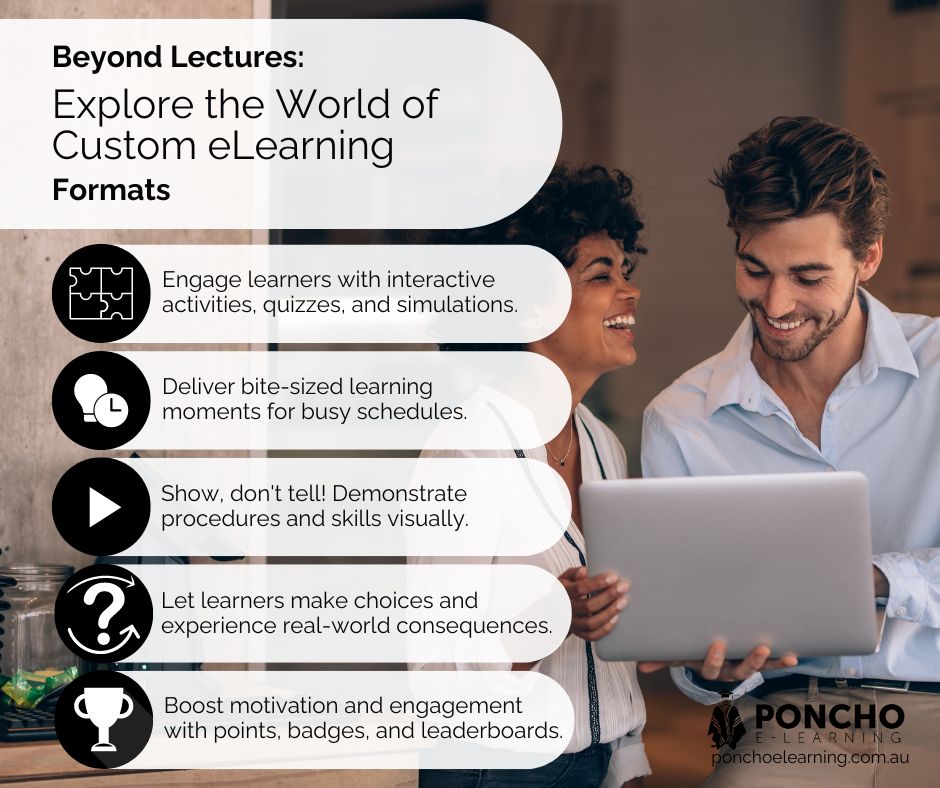Navigating the diverse training needs of Australian businesses can be challenging. Custom e-Learning solutions offer a flexible and effective way to address this challenge. This article explores how different custom eLearning formats can be tailored to meet the specific needs of various Australian industries.

What are the different types of custom e-Learning?
Custom eLearning comes in various formats, allowing you to tailor the learning experience to your specific needs and audience. Popular options include interactive modules, microlearning, video tutorials, branching scenarios, and gamified elements.
Understanding Industry-Specific Training Needs
Before diving into specific formats, it’s crucial to understand the unique training needs of your industry. Explore these key considerations:
- Required skill sets: Identify the specific skills and knowledge your employees need to excel in their roles.
- Learner demographics: Consider the age, experience level, and preferred learning styles of your target audience.
- Learning objectives: Clearly define your training goals and desired outcomes.
- Regulatory requirements: Some industries have mandatory training requirements that custom e-Learning can be designed to address.
By thoroughly understanding your industry’s unique training landscape, you can choose the most effective custom eLearning format to meet your specific needs.

Custom e-Learning Formats: Tailoring for Australian Industries
1. Interactive Modules
These modules combine various elements, like text, images, videos, and quizzes, to create engaging and interactive learning experiences. They’re well-suited for delivering complex information, allowing learners to explore content at their own pace and test their understanding.
Industry Applications:
- Manufacturing: Train employees on safety procedures, operational processes, and new equipment functionalities.
- Healthcare: Educate healthcare professionals on new regulations, treatment protocols, and specific medical procedures.
- Finance: Train staff on financial regulations, compliance procedures, and complex financial products.
2. Microlearning
This format delivers bite-sized learning modules that focus on specific skills or topics. Microlearning is ideal for busy learners who need to acquire knowledge quickly and conveniently.
Industry Applications:
- Retail: Train staff on new product knowledge, customer service techniques, and handling different sales scenarios.
- Hospitality: Train employees on various hospitality skills, such as guest communication protocols, handling complaints, and food safety procedures.
- Construction: Provide safety training on specific hazards, equipment operation procedures, and emergency response protocols.
3. Video Tutorials
Video content can be a highly engaging and effective way to deliver information, especially for demonstrating practical skills and procedures.
Industry Applications:
- IT: Train employees on new software applications, troubleshooting techniques, and cybersecurity best practices.
- Education: Educators can utilise video tutorials to deliver engaging and visually stimulating lessons on complex concepts, historical figures, or events.
- Engineering: Demonstrate how to operate and maintain specific equipment, troubleshoot technical issues, and showcase design and engineering concepts.
4. Branching Scenarios
This format presents learners with real-world scenarios and allows them to make choices. Based on their decisions, they receive different outcomes and feedback, enabling them to practice decision-making skills in a safe learning environment.
Industry Applications:
- Sales: Train sales representatives on handling different customer objections and effectively closing deals.
- Human Resources: Train HR professionals on handling sensitive workplace situations, navigating employee conflict, and conducting performance reviews.
- Management: Help managers develop decision-making skills by allowing them to practice handling real-world workplace challenges like employee performance issues, resource allocation, and conflict resolution.
5. Gamification
Incorporate game-like elements such as points, badges, and leaderboards to boost learner motivation and engagement.
Industry Applications:
- Marketing: Create interactive training modules on marketing strategies, social media best practices, and campaign management.
- Logistics: Implement gamification to train logistics personnel on efficient route planning, inventory management, and supply chain optimisation.
- Customer Service: Train customer service representatives on handling challenging customer interactions and resolving complex issues effectively.
By understanding your industry’s specific needs and utilising the diverse capabilities of custom e-Learning formats, you can equip your Australian workforce with the skills and knowledge they need to excel in today’s dynamic business landscape.




